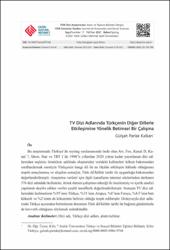| dc.contributor.author | Parlak Kalkan, Gülşah | |
| dc.date.accessioned | 2021-06-25T12:42:50Z | |
| dc.date.available | 2021-06-25T12:42:50Z | |
| dc.date.issued | 2021 | en_US |
| dc.identifier.citation | PARLAK KALKAN, Gülşah. "TV Dizi Adlarında Türkçenin Diğer Dillerle Etkileşimine Yönelik Betimsel Bir Çalışma". FSM İlmi Araştırmalar İnsan ve Toplum Bilimleri Dergisi, 17 (2021): 715-750. | en_US |
| dc.identifier.uri | https://dergipark.org.tr/tr/pub/fsmia/issue/62991/957146 | |
| dc.identifier.uri | https://hdl.handle.net/11352/3699 | |
| dc.description.abstract | Bu araştırmada Türkiye’de reyting sıralamasında önde olan Atv, Fox, Kanal D, Ka nal 7, Show, Star ve TRT 1’de 1990’lı yıllardan 2020 yılına kadar yayınlanan dizi adlarından seçkisiz örneklem şeklinde oluşturulan verideki kelimeleri köken bakımından
sınıflandırmak suretiyle Türkçenin hangi dil ile ne ölçüde etkileşim hâlinde olduğunun
tespiti amaçlanmış ve ulaşılan sonuçlar, Türk dil/kültür tarihi ile uygunluğu bakımından
değerlendirilmiştir. Araştırma verileri için ilgili kanalların internet sitelerinden derlenen
576 dizi adındaki kelimeler, örnek durum çalışması tekniği ile incelenmiş ve içerik analizi
yapılarak deşifre edilen veriler çeşitli tasniflerle değerlendirilmiştir. Sonuçta TV dizi ad larındaki kelimelerin %55’inin Türkçe, %31’inin Arapça, %8’inin Farsça, %4.5’inin batı
kökenli ve %2’sinin de kökeninin belirsiz olduğu tespit edilmiştir. Dolayısıyla dizi adla rında Türkçe açısından betimlenen durumun Türk dil/kültür tarihi ile bağının günümüzde
de kuvvetli olduğunu söylemek mümkündür | en_US |
| dc.description.abstract | In this study, in order to classify the words in the data formed as a random sample of
the series names from the 1990s to 2020 in Atv, Fox, Kanal D, Kanal 7, Show, Star and
TRT 1, which are at the top of the rating order in Turkey, to classify the words in terms of
origin and It was aimed to determine the extent of interaction with the language and the
results obtained were examined in terms of their compatibility with the Turkish language
/ cultural history. The words in 576 series, which were compiled from the websites of the
relevant channels for the research data, were analyzed with the case study technique and
the data deciphered by content analysis was evaluated with various classifications. As
a result, it has been determined that 55% of the words in TV series names are Turkish,
31% Arabic, 8% Persian, 4.5% Western and 2% uncertain origin. Therefore, it is possible
to say that the situation described in terms of Turkish in the series titles and the Turkish
language / cultural history is still strong today | en_US |
| dc.language.iso | tur | en_US |
| dc.publisher | FSM Vakıf Üniversitesi | en_US |
| dc.relation.isversionof | 10.16947/fsmia.957146 | en_US |
| dc.rights | info:eu-repo/semantics/openAccess | en_US |
| dc.subject | Dizi adı | en_US |
| dc.subject | Türkçe dizi adları | en_US |
| dc.subject | Alıntı kelime | en_US |
| dc.subject | Series name | en_US |
| dc.subject | Turkish series names | en_US |
| dc.subject | Citation word | en_US |
| dc.title | TV Dizi Adlarında Türkçenin Diğer Dillerle Etkileşimine Yönelik Betimsel Bir Çalışma | en_US |
| dc.title.alternative | A Descriptive Study on the Interaction of Turkish with Other Languages in TV Series Titles | en_US |
| dc.type | article | en_US |
| dc.relation.journal | FSM İlmî Araştırmalar İnsan ve Toplum Bilimleri Dergisi | en_US |
| dc.contributor.department | FSM Vakıf Üniversitesi, Rektörlük, FSM İlmî Araştırmalar İnsan ve Toplum Bilimleri Dergisi | en_US |
| dc.contributor.authorID | https://orcid.org/0000-0003-0986-9768 | en_US |
| dc.identifier.issue | 17 | en_US |
| dc.identifier.startpage | 715 | en_US |
| dc.identifier.endpage | 750 | en_US |
| dc.relation.publicationcategory | Makale - Ulusal Hakemli Dergi - Başka Kurum Yazarı | en_US |



















